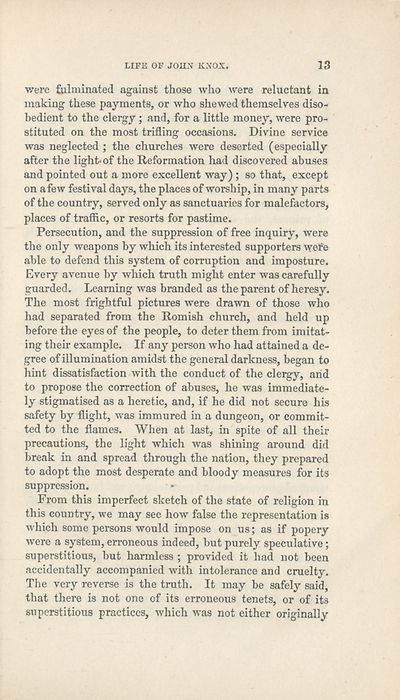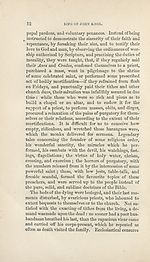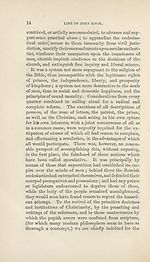Download files
Complete book:
Individual page:
Thumbnail gallery: Grid view | List view

LIFE OF JOHN KNOX.
13
were fulminated against those who were reluctant in
making these payments, or who shewed themselves diso¬
bedient to the clergy; and, for a little money, were pro¬
stituted on the most trifling occasions. Divine service
was neglected ; the churches were deserted (especially
after the light-of the Reformation had discovered abuses
and pointed out a more excellent way); so that, except
on a few festival days, the places of worship, in many parts
of the country, served only as sanctuaries for malefactors,
places of traffic, or resorts for pastime.
Persecution, and the suppression of free inquiry, were
the only weapons by which its interested supporters were
able to defend this system of corruption and imposture.
Every avenue by which truth might enter was carefully
guarded. Learning was branded as the parent of heresy.
The most frightful pictures were drawn of those who
had separated from the Romish church, and held up
before the eyes of the people, to deter them from imitat¬
ing their example. If any person who had attained a de¬
gree of illumination amidst the general darkness, began to
hint dissatisfaction with the conduct of the clergy, and
to propose the correction of abuses, he was immediate¬
ly stigmatised as a heretic, and, if he did not secure his
safety by flight, was immured in a dungeon, or commit¬
ted to the flames. When at last, in spite of all their
precautions, the light which was shining around did
break in and spread through the nation, they prepared
to adopt the most desperate and bloody measures for its
suppression.
From this imperfect sketch of the state of religion in
this country, we may see how false the representation is
which some persons would impose on us; as if popery
were a system, erroneous indeed, hut purely speculative;
superstitious, but harmless ; provided it had not been
accidentally accompanied with intolerance and cruelty.
The very reverse is the truth. It may be safely said,
that there is not one of its erroneous tenets, or of its
superstitious practices, which was not either originally
13
were fulminated against those who were reluctant in
making these payments, or who shewed themselves diso¬
bedient to the clergy; and, for a little money, were pro¬
stituted on the most trifling occasions. Divine service
was neglected ; the churches were deserted (especially
after the light-of the Reformation had discovered abuses
and pointed out a more excellent way); so that, except
on a few festival days, the places of worship, in many parts
of the country, served only as sanctuaries for malefactors,
places of traffic, or resorts for pastime.
Persecution, and the suppression of free inquiry, were
the only weapons by which its interested supporters were
able to defend this system of corruption and imposture.
Every avenue by which truth might enter was carefully
guarded. Learning was branded as the parent of heresy.
The most frightful pictures were drawn of those who
had separated from the Romish church, and held up
before the eyes of the people, to deter them from imitat¬
ing their example. If any person who had attained a de¬
gree of illumination amidst the general darkness, began to
hint dissatisfaction with the conduct of the clergy, and
to propose the correction of abuses, he was immediate¬
ly stigmatised as a heretic, and, if he did not secure his
safety by flight, was immured in a dungeon, or commit¬
ted to the flames. When at last, in spite of all their
precautions, the light which was shining around did
break in and spread through the nation, they prepared
to adopt the most desperate and bloody measures for its
suppression.
From this imperfect sketch of the state of religion in
this country, we may see how false the representation is
which some persons would impose on us; as if popery
were a system, erroneous indeed, hut purely speculative;
superstitious, but harmless ; provided it had not been
accidentally accompanied with intolerance and cruelty.
The very reverse is the truth. It may be safely said,
that there is not one of its erroneous tenets, or of its
superstitious practices, which was not either originally
Set display mode to:
![]() Universal Viewer |
Universal Viewer | ![]() Mirador |
Large image | Transcription
Mirador |
Large image | Transcription
| Antiquarian books of Scotland > Scotland/Scots > Life of John Knox ; and, The life of Alexander Henderson > (31) |
|---|
| Permanent URL | https://digital.nls.uk/131832676 |
|---|
| Description | Thousands of printed books from the Antiquarian Books of Scotland collection which dates from 1641 to the 1980s. The collection consists of 14,800 books which were published in Scotland or have a Scottish connection, e.g. through the author, printer or owner. Subjects covered include sport, education, diseases, adventure, occupations, Jacobites, politics and religion. Among the 29 languages represented are English, Gaelic, Italian, French, Russian and Swedish. |
|---|

